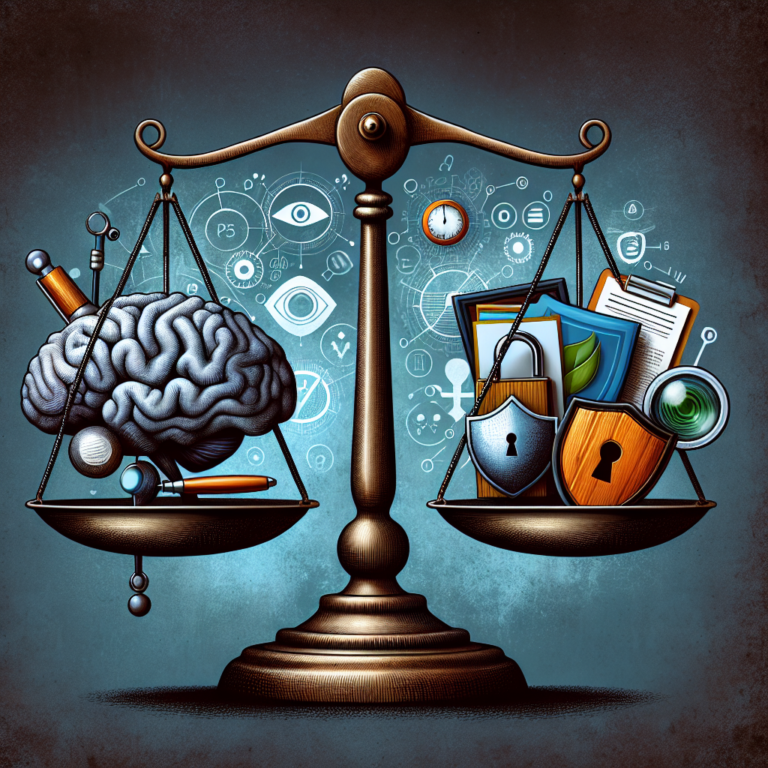Introduction
In the complex landscape of mental health, the traditional approach to psychological testing is undergoing a revolutionary transformation. As we stand on the cusp of exciting changes, the question arises: How can we truly enhance diagnostics to benefit individuals seeking understanding and solutions? The Future of Psychological Testing: Innovations that Enhance Diagnostics promises not only to refine the tools we use but also to deepen our understanding of the human mind. This article delves into the groundbreaking innovations that are shaping the future of psychological testing, providing unique insights, detailed case studies, and a perspective on what lies ahead.
The Evolution of Psychological Testing
Historical Context
Psychological testing has a rich history, starting from simple observational methods to the sophisticated assessments we see today. Instruments like the Wechsler Intelligence Scale and the Minnesota Multiphasic Personality Inventory (MMPI) laid foundational stones. These tools, however, largely depend on standardized procedures and questionnaires that might not always capture the intricacies of individual experiences.
As society grows increasingly complex, engaging with diverse populations and varying cultural contexts, the need for more adaptive and sensitive testing methods is clearer than ever.
The Role of Technology
With the technological advancements of the 21st century, we are witnessing significant shifts in how psychological assessments are conducted. From online testing platforms to artificial intelligence-enabled assessments, technology serves as a catalyst for innovation. As we explore The Future of Psychological Testing: Innovations that Enhance Diagnostics, it’s essential to recognize how these technologies can lead to better patient outcomes and more accurate diagnostics.
Innovations in Psychological Testing
Digital Platforms and Online Assessments
Case Study: The Beck Depression Inventory (BDI)
One of the classic tools for measuring depression is the Beck Depression Inventory, traditionally a pencil-and-paper tool. Recently, the BDI has been adapted into online versions, which allow for instant scoring and results. This transition to digital assessments helps address issues like accessibility and anonymity, ensuring that individuals can undergo testing in comfortable environments.
Relevance to Diagnostics: The digital version of the BDI allows for quicker and more efficient data collection, enhancing the overall diagnostic process by leveraging technology to reach a wider population.
Artificial Intelligence in Diagnostics
AI is revolutionizing the field of psychological testing by analyzing patterns and predicting outcomes with a level of accuracy previously unattainable. Tools like Woebot, a mental health chatbot, utilize AI to provide real-time emotional support and preliminary diagnostics for users.
Case Study: Woebot
Woebot operates through a conversational interface, gathering user data and providing discussions tailored to emotional states. Research indicates that individuals interacting with Woebot report reduced symptoms of anxiety and depression.
Relevance to Diagnostics: By offering immediate insights and support, AI tools like Woebot can serve as preliminary diagnostic aids, encouraging users to seek further professional help if needed.
Neuropsychological Assessments
As neuroscience advances, neuropsychological assessments are becoming more sophisticated. Using brain imaging and biometrics, these assessments provide insights into cognitive functions that affect mental health.
Case Study: Functional MRI (fMRI) in Diagnostics
Functional MRI has been used in academic research to study the brains of individuals with various psychological disorders. These scans can offer valuable data about brain activity patterns correlated with specific emotions or behaviors.
Relevance to Diagnostics: This innovative approach provides an objective view of psychological conditions, enhancing the accuracy of diagnoses and leading to more tailored treatment options.
The Importance of Cultural Competence in Testing
Adapting Assessments for Diverse Populations
Psychological tests often rely on normative data that may not reflect the experiences of diverse cultural groups. This highlights the need for innovations in cultural competence within psychological assessments.
Case Study: Culturally Adapted Versions of the MMPI
The MMPI has been adapted for various cultures to improve its relevance and reliability. Research shows these culturally specific tests yield better predictive validity and user comfort.
Relevance to Diagnostics: Culturally adapted assessments ensure that diagnostic tools remain effective across different populations, which enhances overall mental health outcomes.
Real-World Applications and Impacts
Integration into Clinical Practice
The integration of innovative psychological testing tools into clinical practice is essential for enhancing diagnostics. Health professionals must remain informed about emerging trends and technologies to provide the best care possible.
Case Study: The Use of Predictive Analytics
Predictive analytics can assess the likelihood of various outcomes based on historical data. In mental health, predictive models are employed to identify risk factors for conditions like PTSD and depression.
Relevance to Diagnostics: This proactive approach enables clinicians to tailor interventions before conditions worsen, a move that aligns with current trends pushing for preventative care in healthcare.
Future Directions and Challenges
Ethical Considerations in Psychological Testing
The Future of Psychological Testing: Innovations that Enhance Diagnostics comes with ethical considerations, especially concerning data privacy and informed consent. As digital assessments gain popularity, safeguarding patient information and adhering to ethical standards must remain a priority.
Training Professionals in New Innovations
As new tools emerge, training healthcare professionals in these evolving methodologies is critical. Ongoing education programs will ensure practitioners are well-versed in the latest diagnostic innovations, leading to better patient care.
Conclusion
As we navigate The Future of Psychological Testing: Innovations that Enhance Diagnostics, it’s clear that the advancements in technology and methods present exciting possibilities for understanding and treating mental health conditions. By embracing these innovations and ensuring their ethical implementation, we can enhance the diagnostic process, ultimately leading to improved outcomes for individuals seeking help. The future holds promise—let’s stride confidently into it and continue to innovate for a mentally healthier world.
FAQs
1. What are the latest innovations in psychological testing?
Recent developments include digital platforms, artificial intelligence, neuropsychological assessments, and culturally adapted tests.
2. How does AI enhance psychological diagnostics?
AI technologies analyze data patterns, allowing for more accurate and timely diagnostic assessments, potentially even before a professional consultation.
3. Are online psychological tests reliable?
When validated and used appropriately, online platforms can provide reliable assessments, especially when they incorporate established testing standards.
4. What ethical issues arise from the use of technology in psychological testing?
Key concerns revolve around data privacy, informed consent, and ensuring that technologically-driven tests serve all population groups equitably.
5. How can mental health professionals keep up with innovations in testing?
Ongoing education, professional development opportunities, and engagement with current mental health research can help professionals stay updated in this rapidly evolving field.
This article aims to provide a well-rounded view of The Future of Psychological Testing: Innovations that Enhance Diagnostics. With each innovation, we move closer to a more nuanced understanding of mental health, ensuring that testing evolves alongside our growing knowledge of the human mind.















